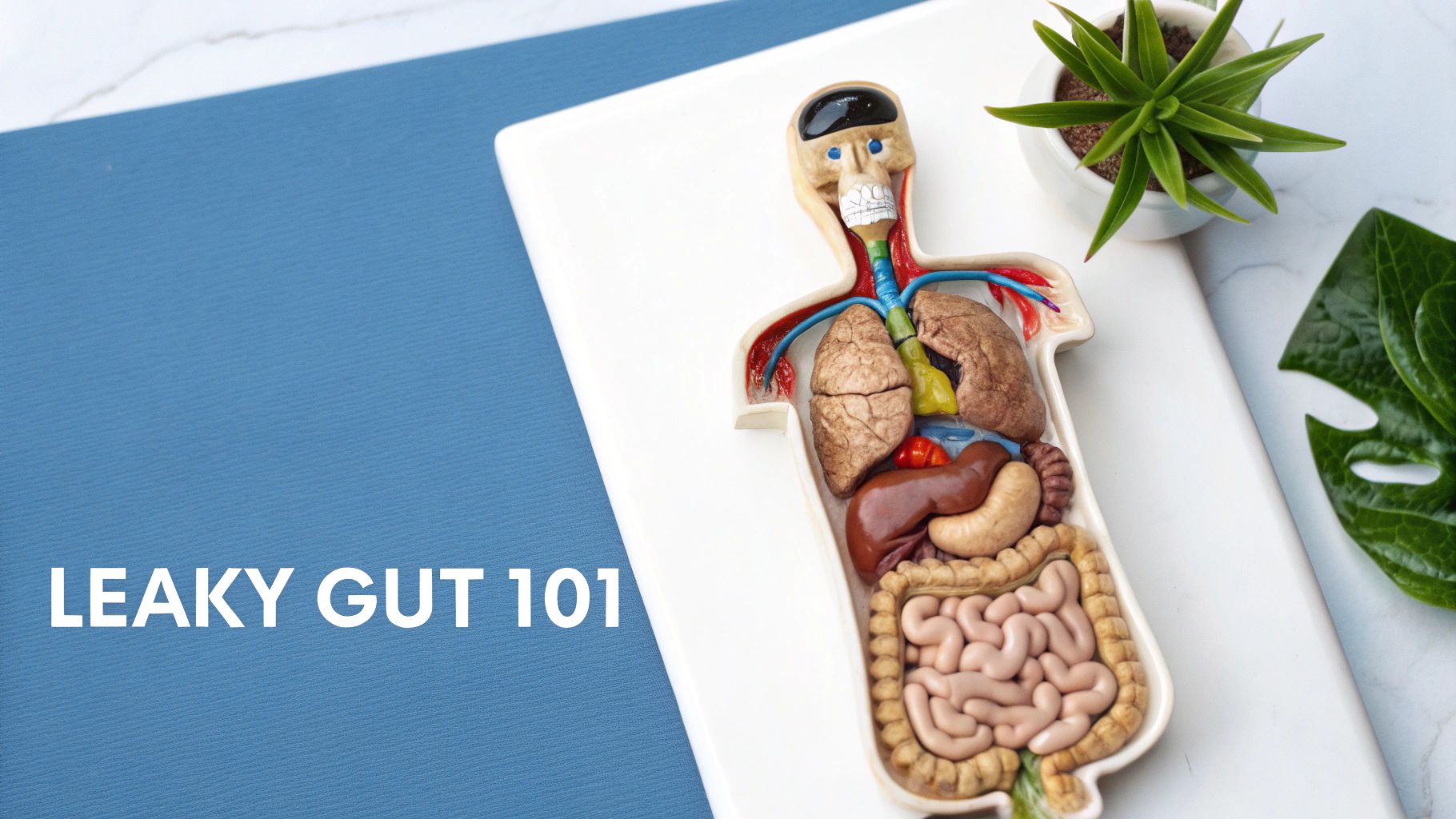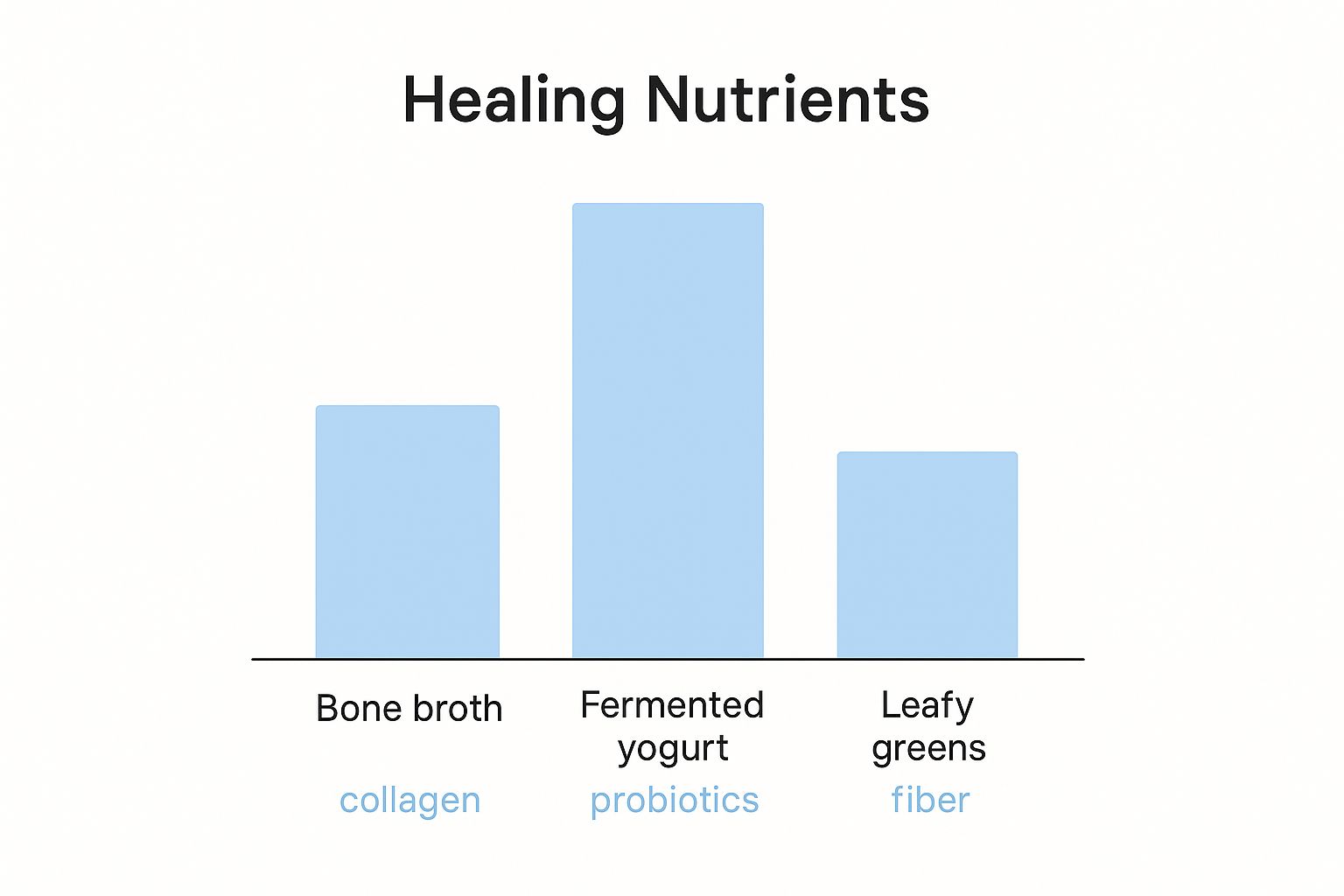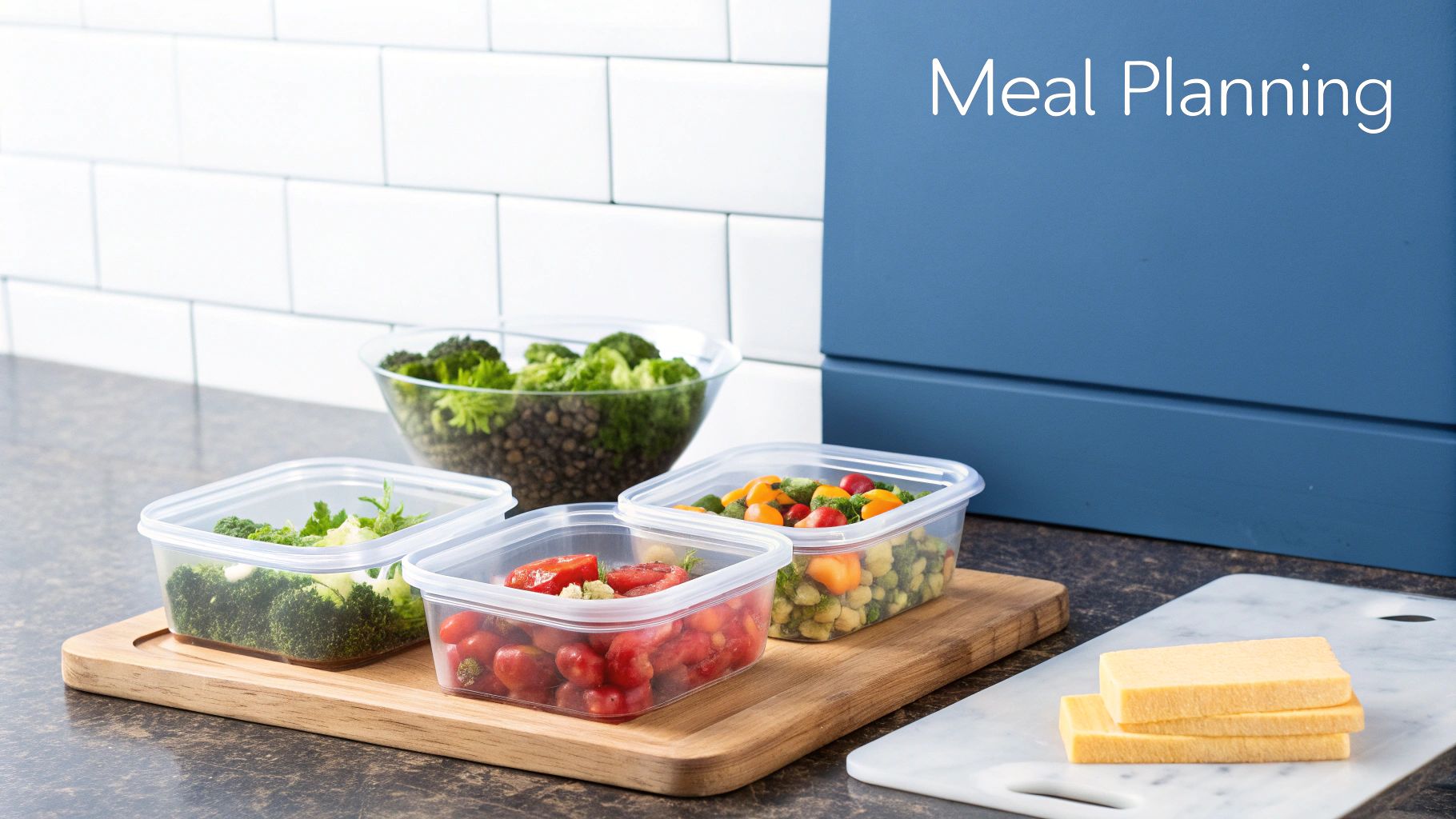What's Really Happening When Your Gut Goes Rogue

This image gives you a visual of intestinal permeability, showing how things can pass through the lining of your gut. When we talk about "leaky gut," this is exactly what we mean – those tight junctions, which should be acting like vigilant gatekeepers, get a little too relaxed.
This relaxation allows things that should stay put in your digestive system – things like partially digested food and toxins – to sneak into your bloodstream. And trust me, this isn't some abstract concept; it can have real-world effects on your well-being.
Think of your gut lining like a fine mesh net, carefully designed to keep the good stuff in and the bad stuff out. When it's working as it should, nutrients get absorbed into your bloodstream, while harmful substances are kept safely contained.
But with leaky gut, this net develops holes. Suddenly, undigested food particles, toxins, and even bacteria can escape into your circulation. This triggers a chain reaction that can lead to all sorts of issues – inflammation, digestive upset, skin problems, and even autoimmune responses.
The root causes of leaky gut are complicated. It involves disruptions in the intestinal epithelial barrier, allowing toxins and undigested food particles to slip into the bloodstream. This is often linked to factors common in Western lifestyles, which also contribute to a rise in inflammatory bowel diseases. You can learn more about the complexities of this issue here.
You might be wondering why your body reacts so strongly to these "escapees." Your immune system, constantly on the lookout for trouble, recognizes these foreign invaders in a place they don’t belong.
This triggers inflammation – a protective response designed to deal with threats. Think of your immune system as a security team. They see these foreign particles out of place and go on high alert, launching an inflammatory attack.
While helpful in the short term, this constant state of high alert can wear your system down. This chronic inflammation can contribute to symptoms like brain fog, fatigue, and joint pain. Understanding this process is the first step toward healing your gut and getting back on track.
The Foods That Actually Make a Difference
Forget what you think you know about "healthy" eating for a leaky gut. I've seen so many people diligently munching on salads and whole grains, totally confused about why they're still not feeling well. The problem? Some "health foods" can actually irritate a leaky gut. Let's ditch the confusion and talk about foods that genuinely help – from bone broth (which is so much more than just hype) to veggies that actually soothe instead of causing problems.
Nourishing Your Gut From the Inside Out
Healing a leaky gut is less about restriction and more about giving your body what it needs to repair itself. This means prioritizing foods packed with nutrients that specifically support gut health.
-
Bone Broth: Seriously, this stuff is liquid gold! It’s loaded with collagen, which provides the amino acids your gut needs to mend its lining. Think of it as the glue that holds everything together. I started drinking bone broth daily, and honestly, the improvement in my digestion was remarkable.
-
Fermented Foods: Kimchi, sauerkraut, and full-fat yogurt with live cultures are your friends. They deliver beneficial bacteria (probiotics) right where they're needed, helping to rebalance your gut microbiome. This balance is key for good digestion and overall well-being.
-
Leafy Greens: While some raw veggies can be irritating, cooked leafy greens like spinach and kale are a different story. They offer gentle fiber that nourishes the good bacteria in your gut. Fiber acts as a prebiotic, essentially feeding the probiotics and helping them thrive.
-
Healthy Fats: Avocados, olive oil, and coconut oil bring anti-inflammatory power to the table and also help your body absorb important vitamins. Plus, they help keep things moving smoothly through your digestive tract.
To help you visualize the benefits of these foods, check out the table below:
To illustrate the importance of these foods, I’ve put together a simple comparison table:
| Foods to Include | Why They Help | Foods to Avoid | Why They Harm |
|---|---|---|---|
| Bone Broth | Rich in collagen, which repairs the gut lining | Gluten | Can cause inflammation in the gut |
| Fermented Foods (kimchi, sauerkraut, yogurt with live cultures) | Introduces beneficial bacteria (probiotics) | Dairy | Can cause inflammation in the gut |
| Cooked Leafy Greens (spinach, kale) | Provides gentle fiber that nourishes good gut bacteria | Sugar | Disrupts the balance of the gut microbiome |
| Healthy Fats (avocados, olive oil, coconut oil) | Offer anti-inflammatory benefits and support vitamin absorption | Processed Foods | Contribute to inflammation and feed harmful bacteria |
This table gives you a quick snapshot of what to focus on and what to avoid as you start healing your gut. Remember, everyone's different, so pay attention to how your body responds to different foods.

This infographic offers a visual comparison of the collagen in bone broth, probiotics in yogurt, and fiber in leafy greens. You can see how incorporating these foods significantly boosts these key nutrients.
Identifying Hidden Irritants
Adding gut-healing foods is a great start, but you also need to detective those sneaky irritants that might be causing trouble. Everyone's different, so listen to your body!
-
Gluten and Dairy: These are common culprits behind gut inflammation. Even if you haven’t been diagnosed with an intolerance, temporarily removing them from your diet can give your gut a chance to heal.
-
Sugar and Processed Foods: These guys wreak havoc on your gut microbiome, feeding the bad bacteria and fanning the flames of inflammation. Reducing them can make a world of difference.
-
Hidden Sugars: Be aware of sneaky sugars in things like sauces, dressings, and even some yogurts. Check labels and choose whole, unprocessed foods as much as possible.
Timing and Meal Composition
What you eat matters, but how you eat matters too. Spacing out your meals and avoiding huge portions can really help take the burden off your digestive system. For me, smaller, more frequent meals made a noticeable difference.
-
Mindful Eating: Slow down, chew your food thoroughly, and actually taste it. This helps with digestion and reduces gut irritation. I used to inhale my food, and it definitely made my digestive issues worse. Slowing down was a game-changer.
-
Hydration: Staying well-hydrated is crucial for good digestion and helps flush out toxins. Aim for at least eight glasses of water a day, especially if you’re upping your fiber intake.
Healing a leaky gut takes time, so be patient with yourself, pay attention to what your body tells you, and acknowledge your progress. It’s not about being perfect, but about creating sustainable habits for a healthier, happier gut.
Supplements That Actually Earn Their Price Tag

Navigating the world of supplements when you're dealing with leaky gut can feel overwhelming, right? It's easy to fall for marketing hype and end up with a cupboard full of products that don't work. Trust me, I've been there. Through trial and error (and lots of conversations with health practitioners), I've learned that choosing the right supplements and using them correctly is key. Let's ditch the confusion and focus on what actually makes a difference.
Probiotics: Beyond the Hype
Probiotics are crucial for healing leaky gut, but many don't survive the journey to your intestines. Think of it like sending delicate flowers across the country – they need special packaging! That's where spore-forming probiotics and delayed-release capsules come in. They're designed to withstand stomach acid and actually reach your gut. Switching to a high-quality, spore-forming probiotic made a noticeable difference in my digestion.
L-Glutamine: Repair and Rebuild
L-glutamine, an amino acid, is like giving your gut lining the building blocks it needs for repair. Think of it as patching up those leaky spots. I found that taking L-glutamine with meals, instead of on an empty stomach, was gentler on my system. Consistent, moderate doses are more effective than mega-doses.
Hemp Protein: My Gut's Best Friend
Hemp protein has been a game-changer for me. It's incredibly digestible, full of fiber, and boasts anti-inflammatory omega-3 fatty acids. Unlike some protein powders that can irritate a leaky gut, hemp protein feels soothing and supportive. My daily smoothie wouldn't be the same without it. For more information on hemp protein and leaky gut, check out this article: Top 8 Best Supplements for Leaky Gut in 2025.
Digestive Enzymes: Maximize Absorption
Digestive enzymes help break down food, making it easier for your body to absorb nutrients. This is especially important when you have leaky gut, as your digestion might not be at its best. For me, taking digestive enzymes with meals really helped reduce bloating and gas. Plus, it addresses those pesky nutrient deficiencies that often come with leaky gut.
Timing Is Everything (and Combinations Matter)
When you take your supplements can significantly impact their effectiveness. Probiotics, for example, often do better on an empty stomach. But other supplements, like L-glutamine, are best taken with food. Also, some supplements work better together, while others can clash. Talking to a healthcare professional is always a good idea to figure out the optimal timing and combinations for your individual needs.
Die-Off Reactions: The Temporary Downside
As your gut starts to heal, you might experience some temporary discomfort. These die-off reactions are caused by the elimination of bad bacteria and toxins. Think of it as house cleaning – it can get messy before it gets clean! Symptoms like fatigue, headaches, or digestive upset can pop up. It's not fun, but it often means things are working. Hydration and rest are your best allies during this time. I went through this myself, and knowing it was temporary helped me keep going.
I've put together a table summarizing some key supplements that have helped me on my healing journey. It includes dosages, timing, and what they're good for. Remember, this is just a starting point, and you should always consult with your healthcare provider.
Essential Gut-Healing Supplements Protocol
Key supplements for leaky gut recovery with dosages, timing, and expected benefits
| Supplement | Dosage | Best Time to Take | Primary Benefits |
|---|---|---|---|
| Spore-forming Probiotics | As directed on product label (typically 1-2 capsules) | Empty stomach | Survive stomach acid, colonize gut, improve digestion |
| L-Glutamine | 5-10 grams | With meals | Repair gut lining, reduce inflammation |
| Hemp Protein | 1-2 scoops (20-40 grams) | Anytime | Highly digestible protein, fiber, omega-3s, supports healing |
| Digestive Enzymes | As directed on product label (typically 1-2 capsules) | With meals | Improve digestion, reduce bloating and gas, enhance nutrient absorption |
This table provides a general overview. It's essential to work with a healthcare professional to determine the best dosages and combinations for your individual needs.
Healing leaky gut with supplements is a personal journey. What works wonders for one person might not do the same for another. Experimentation and tracking your progress are important. Be patient with yourself, and remember, it's a process!
The Lifestyle Shifts That Seal the Deal
Let's be honest: perfect nutrition and supplements are fantastic, but if your lifestyle is fighting against you, healing a leaky gut feels like an uphill battle. It's like pouring water into a leaky bucket – frustrating and ineffective. So let's talk about the lifestyle tweaks that really make a difference. These are the changes that truly "seal the deal."
Stress: More Than Just a Feeling
Stress impacts every part of your body, especially your gut. When you're stressed, your body pumps out cortisol. This hormone can disrupt your gut microbiome's delicate balance and worsen leaky gut. I used to think stress management was all spa days and meditation retreats. Not realistic, right? I finally realized it's about finding what actually works for you. A brisk walk? Journaling? A few minutes of deep breathing? Find your stress-busting tool and use it!
Sometimes, even identifying what's stressing you out can be the first step towards healing. It's not always obvious!
Sleep: The Ultimate Gut Reset
Think of sleep as your gut's nightly maintenance period. This is when your body repairs and restores itself, including your digestive system. Skimping on sleep robs your gut of this vital recovery time. A regular sleep schedule and a calming bedtime routine can work wonders. I personally found that avoiding large meals close to bedtime significantly improved my sleep. This, in turn, really helped my gut healing journey.
Another tip? Be mindful of your meal timing. Give your body enough time to digest before hitting the hay. This contributes to better sleep and gives your gut a head start on its overnight repair work.
Movement: Finding the Right Balance
Exercise is important, but high-intensity workouts can actually divert energy away from gut repair. While regular, moderate exercise is great for gut health, going too hard while focusing on healing leaky gut might be counterproductive. Think gentle yoga, walks in nature, or swimming instead of hardcore gym sessions. When I was dealing with gut issues, I swapped intense HIIT classes for long walks outside. The change in my energy levels and digestion was incredible.
Toxin Exposure: Minimizing the Assault
Our guts face a constant barrage of toxins from food, water, and the environment. You can't avoid all toxins, but minimizing exposure can take a huge load off your gut. Simple things like choosing organic produce, filtering your water, and using natural cleaning products can make a real difference. Even swapping plastic food storage containers for glass was a game-changer for me.
Interested in more simple tweaks? Check out this article: 8 Simple Diet and Lifestyle Tweaks to Improve Your Microbiome. It's surprising how many people aren't aware of these issues. A recent survey showed that only 27% of Americans know what "leaky gut syndrome" is. You can learn more about American's understanding of gut health here.
Building Sustainable Habits
These lifestyle changes aren't about perfection; they're about creating sustainable habits for long-term gut health. It's about progress, not perfection. Start small. Pick one or two changes you can realistically stick with. Gradually add more as you go. This is a journey, not a race. Remember, even small, consistent changes can have a huge impact on your gut health. By focusing on stress management, sleep, moderate movement, and reducing toxin exposure, you create a thriving environment for your gut.
When Leaky Gut Connects to Everything Else

Healing a leaky gut can feel like piecing together a complex puzzle. You begin by tackling the most obvious digestive issues, but then, other unexpected benefits start to pop up. Your skin might clear, achy joints could calm down, and that brain fog might finally lift.
It can feel pretty amazing, but it’s not magic. It’s simply your body showing you how connected everything truly is.
The Gut's Wide-Reaching Influence
Your gut isn't just about digestion; it's a major player in your overall health. A compromised gut lining allows undigested food particles and toxins to leak into your bloodstream, triggering a cascade of reactions throughout your body.
This can show up in surprising ways, from skin problems and joint pain to fatigue and mood swings. For me personally, the most noticeable shift was the disappearance of my persistent brain fog. I hadn't realized how much it had been weighing me down until it was gone!
This link between gut health and seemingly unrelated conditions is central to functional medicine. This approach emphasizes the interconnectedness of your body systems and tackles the root causes of illness, not just the symptoms. I’ve witnessed firsthand how powerful this can be in helping people find real, lasting wellness. You can explore more natural gut health remedies here.
The Autoimmune Connection
Leaky gut is often linked to autoimmune diseases. When foreign particles slip through your gut barrier, your immune system can mistakenly target your own tissues. This can contribute to conditions like Hashimoto's thyroiditis, rheumatoid arthritis, and lupus.
Understanding this connection is crucial for anyone dealing with an autoimmune issue. Addressing gut health can be a game-changer.
Chronic Fatigue and Mood Disorders
The brain-gut axis highlights the intimate relationship between your gut and your brain. Gut inflammation can impact neurotransmitter production, leading to mood swings, anxiety, and even depression.
Leaky gut has also been connected to chronic fatigue syndrome. The constant immune response it triggers can drain your energy, leaving you feeling completely wiped out. I remember feeling perpetually tired before I addressed my own leaky gut. Improving my gut health significantly improved my energy and overall well-being.
The concept of leaky gut has received a lot of attention lately, especially in relation to inflammatory bowel disease (IBD) and autoimmune conditions. Studies show that the prevalence of IBD varies geographically, with the global incidence increasing and shifting from the fifth to the fourth leading cause of death due to gastrointestinal diseases between 1990 and 2017. Learn more about IBD and its global impact.
Recognizing the Connections
Recognizing the link between your gut and other health issues is incredibly empowering. It allows you to target the root cause of your symptoms instead of just managing them superficially.
Pay close attention to any changes you experience as you begin healing your gut. These seemingly small improvements can be important clues to understanding your body's individual needs.
This awareness also helps you communicate more effectively with your healthcare providers, who may not always be up-to-speed on the broader impact of leaky gut. Sometimes, further testing is needed to get a clearer understanding of what’s happening. Working with a knowledgeable practitioner can help you navigate this process and develop a personalized healing strategy.
Navigating Setbacks and Celebrating Small Wins
Healing a leaky gut isn't a linear journey. It's more like a winding road with unexpected bumps and scenic overlooks. Some days you'll feel amazing, and other days you might wonder if you’re even moving forward. This is perfectly normal! Let me share some insights on how to manage the highs and lows.
Tracking Progress Without Obsessing
It’s easy to get caught up analyzing every twinge and gurgle, but that can lead to a lot of unnecessary stress. Instead of focusing on daily fluctuations, try to look at the overall trend. Are you generally feeling better than you were a month ago? Are your good days outnumbering the bad ones? Those are the victories that truly count. I personally found journaling helpful. I’d track my energy levels, digestion, and mood over time. It allowed me to see the bigger picture and stay encouraged.
Decoding Die-Off Reactions
As you begin healing, you might actually experience a temporary worsening of symptoms. This is called a die-off reaction. It happens when harmful bacteria and toxins are eliminated from your gut. Think of it like spring cleaning – things often get messier before they get better. Fatigue, headaches, or digestive upset are common during this phase. I remember feeling pretty rough during my own die-off reaction. Knowing it was temporary and actually a sign of progress helped me get through it.
Distinguishing Healing Reactions From Real Problems
It’s important to be able to tell the difference between a die-off reaction and a genuine problem. Die-off reactions are usually short-lived and relatively mild. If you experience severe or persistent symptoms, it's crucial to talk to your doctor. They can help figure out if something else is going on. For example, a new rash or severe abdominal pain warrants a check-up.
Identifying Your Trigger Patterns
Everyone’s body is different. What bothers one person might be perfectly fine for another. Pay close attention to how your body responds to different foods, stress, and lifestyle factors. This helps you identify your personal triggers so you can avoid them. For me, it was gluten. Even small amounts could set off my symptoms, even though I don’t have celiac disease.
Realistic Timelines and Seeking Help
Healing leaky gut requires time and patience. There’s no magic bullet, and the healing process varies from person to person. Some people feel better within a few weeks, while others may need months or even longer. If you’re not seeing any progress after a reasonable amount of time, don't hesitate to seek professional guidance from a qualified healthcare provider. They can help identify any underlying issues and adjust your healing plan.
Staying Motivated on the Plateau
Plateaus are a normal part of the healing process. You might hit a point where it feels like you're not making any progress, even if you’re doing everything “right.” This doesn’t mean you're failing. Remember why you started this journey. Visualize how you want to feel. Celebrate the small wins, no matter how small they seem. Even seemingly insignificant improvements are steps forward. For me, it was finally being able to enjoy a meal without bloating or discomfort – that was a huge win in my book!
Making Gut Health Your New Normal
Healing your gut is a major win, but like keeping a tidy house, the real magic is maintaining it. How do you make gut health a lasting habit, not just a temporary fix?
Reintroducing Foods: Slow and Steady Wins the Race
After ditching trigger foods, the thought of bringing them back can be scary. Trust me, I've been there! The trick is to go slow. Start with tiny portions of one food, then wait and see how your body reacts.
For example, if you’re trying gluten again, have a small bite of sourdough and wait a few days. No symptoms? Great! Slowly increase the amount next time. This helps you pinpoint what works for you and helps your gut gradually adjust.
Navigating Real Life: Parties, Restaurants, and Travel
Living a normal life with a happy gut takes a bit of planning. Social gatherings can be tricky. I used to stress about eating out, constantly worrying about hidden ingredients. Now, I scope out restaurants with gluten-free or allergy-friendly options beforehand. If I’m heading to a party, I often bring a dish I can enjoy, taking the guesswork out of the meal.
Travel can also be a challenge. Packing your own snacks and supplements keeps you on track. Researching restaurants at your destination is a game-changer too. You don't have to live like a hermit, but a little prep work makes all the difference.
Early Warning Signs: Recognizing When Things Are Off
Learning your body's early warning signs is crucial. Maybe it's slight bloating after eating certain things, a change in your bathroom routine, or feeling extra tired. Noticing these cues lets you address the issue before it becomes a major flare-up. For me, brain fog is a huge red flag. When it appears, I know it's time to check my diet and stress levels.
Stress and Travel: Managing the Inevitable
Stress is part of life, but managing it is vital for gut health. Find what works for you – yoga, deep breathing, nature walks, or music. These daily habits build resilience and protect your gut from stress-induced inflammation.
Travel can also disrupt your gut. Packing probiotics and digestive enzymes helps minimize the effects of changes in your diet and routine. Staying hydrated and sticking to your usual mealtimes (as much as possible) keeps everything running smoothly.
Flexibility and Forgiveness: It's Not About Perfection
Maintaining gut health is a lifelong journey, not a race to perfection. There will be slip-ups, indulgences, and setbacks. Don't be too hard on yourself! These moments are learning opportunities. Flexibility and self-compassion are key. This isn't about restrictions; it's about finding a way of eating and living that supports your gut and lets you enjoy life. Resilience is about bouncing back, not avoiding life altogether.
Ready to fuel your gut health journey with clean, plant-based nutrition? Check out Cantein's range of organic hemp protein powders, supplements, and snacks, designed to support your gut and overall well-being: https://www.cantein.com

